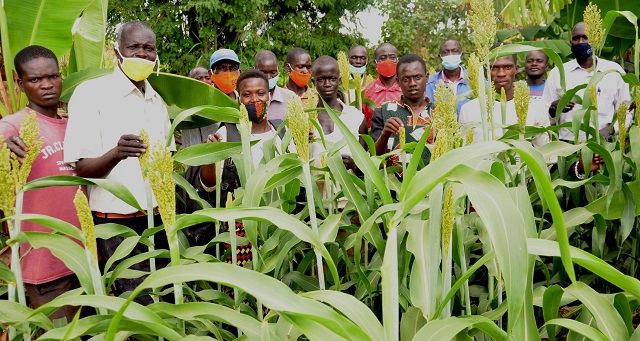The two-year project will see GENU supply over 500 metric tons of quality seeds to farmers at subsidized prices and buy at the harvest at farm gate prices. Courtesy photo Kwania, Uganda | THE INDEPENDENT | About 500 farmers in Kwania district have signed a Memorandum of Understanding with the Global Educational Network to grow sorghum on a commercial scale in a bid to eradicate poverty. Washington Onyum, the General Secretary Kwania District Farmers’ Association signed the MoU with Bongomin Zorish Lander, the Executive Director of the Global Educational Network- GENU.
Kwania District Farmers’ Association comprises 518 farmers drawn from Inomo, Abongomola, Aduku, Nambieso and Chawente sub-counties. The MoU between Kwania District Farmers’ Association and Global Educational Network in Uganda (GENU) is in partnership with Uganda Breweries Limited (UBL) and KCB Bank.
GENU is a non governmental organisation promoting sorghum growing in Lira, Dokolo, Alebtong, Otuke, Kole, Kwania, Lamwo, Kitgum, and Pader district. The two-year project will see GENU supply over 500 metric tons of quality seeds to farmers at subsidized prices and buy at the harvest at farm gate prices. The sorghum will be grown on an estimated 60,000 acres of land in the first phase of the project.
George Ebong, the chairperson Kwania district Framers’ Association described the move as a big boost to the farmer’s group.
Vincent Otile, a farmer from Amude village in Abwong parish in Akali sub county has welcomed the project with excitement and called on fellow farmers to embrace commercial farming to improve their household income.
Lea Apio, another farmer from Olami A in Aduku town council is worried that with the lack of modern agricultural equipment and the late delivery of seeds, most farmers might not reap as big as expected.
Bongomin Zorish Lander, the Executive director Global Educational Network says most farmers have been growing local sorghum varieties mainly for home consumption.
“With the market demand by the brewing industries, farmers should shift to growing hybrid varieties that are suitable for brewing beer and are in high demand that is the only way to go.”
*****
URN
